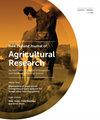在一个多品种奶牛群体中,估计哺乳期间成熟奶牛活重的遗传参数
IF 1.5
3区 农林科学
Q2 AGRICULTURE, MULTIDISCIPLINARY
New Zealand Journal of Agricultural Research
Pub Date : 2023-10-05
DOI:10.1080/00288233.2023.2261875
引用次数: 0
摘要
活重(LWT)是乳制品生产系统的一个重要性状,因为它既影响维持饲料需求,也影响淘汰奶牛和后代剩余到替代奶牛的牛肉收入。新西兰乳业的育种目标包括LWT。本研究估计了新西兰多品种奶牛哺乳期LWT的遗传参数。从1988年至2015年出生的11,222头泌乳奶牛共31,922条LWT记录被用于分析。估计(co)方差成分使用吉布斯抽样从基于谱系的模型。使用量表权重的后验平均遗传力估计在六次哺乳期中始终很高,范围从0.57到0.64。不同哺乳期测得的体重有较高的遗传相关性(> .95)。我们使用训练有素的检查员进一步估计了从第一次哺乳开始记录的主观活重评分的后验平均遗传力,估计值为0.36,低于比例体重的遗传力估计值。此外,不同哺乳期的主观活重评分与体重的遗传相关性在0.91 ~ 0.92之间。建议仅使用比例尺权重进行国家遗传评价。本文章由计算机程序翻译,如有差异,请以英文原文为准。
Estimated genetic parameters for mature cow live weights during lactation in a multi-breed dairy cattle population
Live weight (LWT) is an important trait for dairy production systems as it influences both maintenance feed requirements and beef revenue from culled cows and from offspring surplus to replacements. The breeding goal for the New Zealand dairy industry includes LWT. This study estimated genetic parameters for LWT during lactation from some animals in the New Zealand multi-breed dairy cattle population. A total of 31,922 LWT records from 11,222 lactating dairy cattle born from 1988 to 2015 were used for the analysis. Estimation of (co)variance components used Gibbs sampling from pedigree-based models. The posterior mean heritability estimates using scale weights were consistently high across six lactations and ranged from 0.57 to 0.64. There were high genetic correlations between the scale weights measured during different lactations (>0.95). We further estimated the posterior mean heritability for subjective liveweight scores recorded from first lactation using trained inspectors and the estimate was 0.36, lower than those heritability estimates from scaled weight. Further, the genetic correlations between subjective liveweight score and scale weights at various lactations ranged from 0.91-0.92. It is recommended that only scale weights be used for national genetic evaluation.
求助全文
通过发布文献求助,成功后即可免费获取论文全文。
去求助
来源期刊
CiteScore
4.90
自引率
16.70%
发文量
31
审稿时长
3 months
期刊介绍:
The New Zealand Journal of Agricultural Research publishes original research papers, review papers, short communications, book reviews, letters, and forum articles. We welcome submissions on all aspects of animal and pastoral science relevant to temperate and subtropical regions. The journal''s subject matter includes soil science, fertilisers, insect pests, plant pathology, weeds, forage crops, management systems, agricultural economics, agronomy, and animal science. The journal also accepts crossover papers on subjects such as land –water interactions.

 求助内容:
求助内容: 应助结果提醒方式:
应助结果提醒方式:


